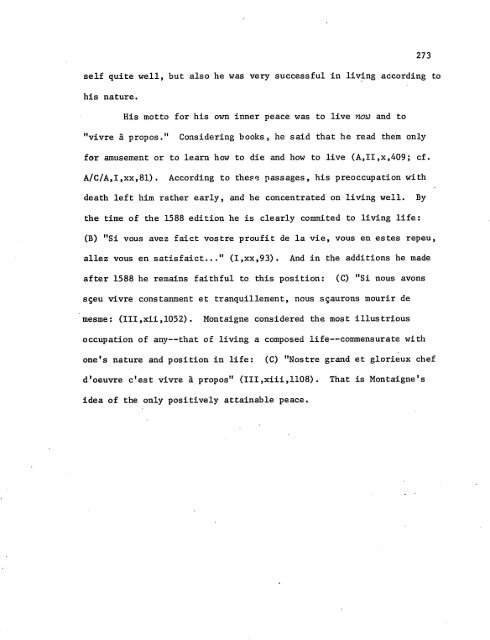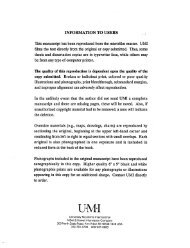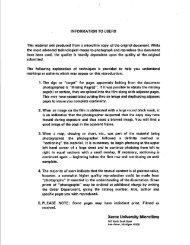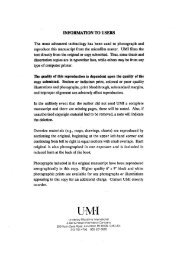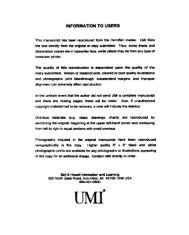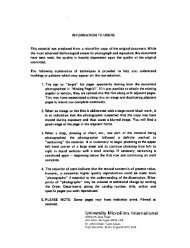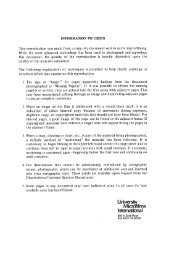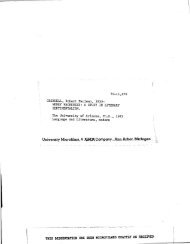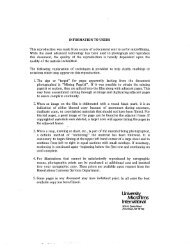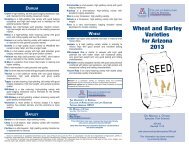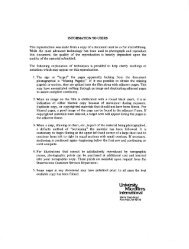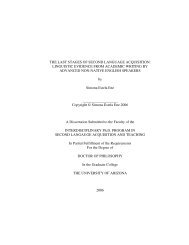- Page 1 and 2:
INFORMATION TO USERS This dissertat
- Page 3 and 4:
MONTAIGNE'S MORAL PREOCCUPATION WIT
- Page 5 and 6:
PLEASE NOTE: Some pages may have in
- Page 7 and 8:
ACKNOWLEDGMENTS This treatise was b
- Page 9 and 10:
V TABLE OF CONTENTS—Continued Pag
- Page 11 and 12:
ABSTRACT Only in relatively brief p
- Page 13 and 14:
ix preservation of political instit
- Page 15 and 16:
CHAPTER 1 INTRODUCTION The Essais o
- Page 17 and 18:
Floyd Gray's comprehensive study of
- Page 19 and 20:
Revol, Jean Plattard and Marc Citol
- Page 21 and 22:
8 I am studying Montaigne and the E
- Page 23 and 24:
there has been a very considerable
- Page 25 and 26:
However, he is neither so bound to
- Page 27 and 28:
nur der Zustand des Rechts, der imr
- Page 29 and 30:
Middle Ages and of the sixteenth ce
- Page 31 and 32:
18 Of. entlerement la politique a l
- Page 33 and 34:
CHAPTER 2 MILITARY EXAMPLES AND ANE
- Page 35 and 36:
on others for wisdom. His humility
- Page 37 and 38:
perform such a purely mechanical ta
- Page 39 and 40:
26 there are about 230 (A) examples
- Page 41 and 42:
874) are Montaigne's verbalization
- Page 43 and 44:
30 indicate anything more than a ge
- Page 45 and 46:
soit passe: encore y a il lors asse
- Page 47 and 48:
For a couple of long paragraphs Mon
- Page 49 and 50:
Reflective Aphorisms The military-r
- Page 51 and 52:
et employer vlgoureusement: j'aime
- Page 53 and 54:
40 tousjours un. Sauf qu'a mesure q
- Page 55 and 56:
42 specific examples should further
- Page 57 and 58:
soul without spending so much time
- Page 59 and 60:
46 Tacitus. In fact, the position o
- Page 61 and 62:
period.He seems to feel more certai
- Page 63 and 64:
ichesses, un advis contraire, et ma
- Page 65 and 66:
52 A few side-by-side comparisons a
- Page 67 and 68:
In reliquis vitae institutis (A) En
- Page 69 and 70:
56 Montaigne, in different words, r
- Page 71 and 72:
58 terror) ut fugientium molem tamq
- Page 73 and 74:
de guerre de nos anciens Gaulois, a
- Page 75 and 76:
l 1 expedition d'icelle, sans respe
- Page 77 and 78:
64 Stylistic Significance These com
- Page 79 and 80:
very little as to the content, ther
- Page 81 and 82:
Amyot has longer, more wordy senten
- Page 83 and 84:
come to grips with the moral proble
- Page 85 and 86:
72 cacheroient ou il se faut presen
- Page 87 and 88:
conclusions. Since they do not foll
- Page 89 and 90:
quotations per essay in which they
- Page 91 and 92:
metaphors and a quotation concernin
- Page 93 and 94:
80 such dominant relationship exist
- Page 95 and 96:
82 If one were to organize the six
- Page 97 and 98:
Montaigne's real stylistic ability.
- Page 99 and 100:
86 war is a generous field of expre
- Page 101 and 102:
military-related metaphor in "De la
- Page 103 and 104:
his essay on the force of one's ima
- Page 105 and 106:
s'eslance bien plus brusquement et
- Page 107 and 108:
image from targetry: (B) "Si, comme
- Page 109 and 110:
A final arbitrary group of simple i
- Page 111 and 112:
98 Whether or not Montaigne's memor
- Page 113 and 114:
100 English sense of the word, and
- Page 115 and 116:
102 Along with the anecdote, the mi
- Page 117 and 118:
104 fits better with the contrast o
- Page 119 and 120:
106 circumstances. The first thing
- Page 121 and 122:
108 in action For them talking is f
- Page 123 and 124:
110 who are cultured and another he
- Page 125 and 126:
112 It is hard not to be just a bit
- Page 127 and 128:
114 comme vehement et brusque ... (
- Page 129 and 130:
116 Un Gentll-hoirane Francois ..."
- Page 131 and 132:
118 the particular seems to ignore
- Page 133 and 134:
120 connection with one of the meta
- Page 135 and 136:
For the modern reader there is a pr
- Page 137 and 138:
124 to added enrichment through car
- Page 139 and 140:
126 an unrelated, nonviolent idea o
- Page 141 and 142:
128 matter of remembering details s
- Page 143 and 144:
130 content and are extensively alt
- Page 145 and 146:
132 He further concludes "Que la na
- Page 147 and 148:
134 to use them, but he embarks on
- Page 149 and 150:
136 difficulty discovering the seam
- Page 151 and 152:
PART TWO MONTAIGNE, MORALITY AND WA
- Page 153 and 154:
Bar-le-Duc, and he is in the retinu
- Page 155 and 156:
142 At the siege of Rouen, where Mo
- Page 157 and 158:
"... un magazin de soldats, la pepi
- Page 159 and 160:
146 own country since 1560, he was
- Page 161 and 162:
148 he has rendered the most devast
- Page 163 and 164:
150 peace. He maintained that a Sta
- Page 165 and 166:
of La Boetie; he rightly interprete
- Page 167 and 168:
154 Picrochole's archers surrender
- Page 169 and 170:
156 They deplored the lack of disci
- Page 171 and 172:
158 the position he is examining, t
- Page 173 and 174:
160 It should not be too surprising
- Page 175 and 176:
162 A second Greek historian-morali
- Page 177 and 178:
164 Montaigne's Latin, Tower Friend
- Page 179 and 180:
166 the opposite must be what Pliny
- Page 181 and 182:
168 even the furious Juno, who now
- Page 183 and 184:
170 necessities of law and order. S
- Page 185 and 186:
should be tempered by clemency and
- Page 187 and 188:
174 Montaigne, and War Justified Th
- Page 189 and 190:
176 belligerents, and he is all too
- Page 191 and 192:
178 that Montaigne's admiration of
- Page 193 and 194:
180 Marechal de Matignon^ and his f
- Page 195 and 196:
182 risk himself: (B) "Ceux qui pre
- Page 197 and 198:
184 The reasons for his acceptance
- Page 199 and 200:
186 as he deplores the means and re
- Page 201 and 202:
188 soldier. Obviously, Montaigne i
- Page 203 and 204:
190 149). Note particularly where i
- Page 205 and 206:
192 (A) L'estimation et le pris d'u
- Page 207 and 208:
194 (II,xvii,658). Although Montaig
- Page 209 and 210:
196 the former not been so terribly
- Page 211 and 212:
198 greatest valor,saying that he w
- Page 213 and 214:
200 aux dangiers, d'autre inconside
- Page 215 and 216:
Socrates and Epaminondas come the c
- Page 217 and 218:
204 discussing his -plus exoellens
- Page 219 and 220:
206 et consequences 3 it is easy to
- Page 221 and 222:
208 favor of Fortune (III,vii,933).
- Page 223 and 224:
210 war; he has admired those who l
- Page 225 and 226:
212 negative weapons for hurting or
- Page 227 and 228:
214 dequoy nous nous glorifions, et
- Page 229 and 230:
of inter-personal and international
- Page 231 and 232:
218 Montaigne does not always follo
- Page 233 and 234:
CHAPTER 5 FORCE AND PEACE War is no
- Page 235 and 236: 222 d'offenser et quereler autruy p
- Page 237 and 238: 224 proceeds to recount (B) "Combie
- Page 239 and 240: 226 for those occasions when it is
- Page 241 and 242: 228 treatment of cruelty takes the
- Page 243 and 244: 230 motivated by his own emotional
- Page 245 and 246: 232 Caesar for having waged a civil
- Page 247 and 248: 234 Civil War so monstrous? It is s
- Page 249 and 250: avoid a civil war but how one might
- Page 251 and 252: 238 the enemy. Civil war is not jus
- Page 253 and 254: Book I. Montaigne's letter to Monsi
- Page 255 and 256: 242 soldier be courageous and energ
- Page 257 and 258: et superficiellement, et en laisser
- Page 259 and 260: 246 necessity and good judgment. Th
- Page 261 and 262: si une telle institution a produit
- Page 263 and 264: 250 With victory as the primary goa
- Page 265 and 266: 252 firearms were the lack of contr
- Page 267 and 268: 254 One of the few times he speaks
- Page 269 and 270: 256 xii,1062). This episode reminds
- Page 271 and 272: 258 realm of natural possibility. O
- Page 273 and 274: which would have each man use his i
- Page 275 and 276: 262 they tend towards peace and tra
- Page 277 and 278: 264 inner peace; the order of natur
- Page 279 and 280: 266 that he who is virtuous is wise
- Page 281 and 282: 268 "...par emprunt ... l'esprit se
- Page 283 and 284: 270 As he said elsewhere (II,xvi,62
- Page 285: 272 self. Hallie looks at change an
- Page 289 and 290: 276 juncture, if one considers the
- Page 291 and 292: 278 l'expression de noz vrays resse
- Page 293 and 294: of a soldier."' He is a soldier, no
- Page 295 and 296: 282 saying he will provide him with
- Page 297 and 298: the innovators and the ruin of the
- Page 299 and 300: 286 "...propagande emancipatrice et
- Page 301 and 302: achieve it. Montaigne's ambition in
- Page 303 and 304: 290 raison de mes discours pour la
- Page 305 and 306: 292 the lack of culture to attend t
- Page 307 and 308: 294 Evolution and Continuum in Mont
- Page 309 and 310: 296 the nobility; not that he is re
- Page 311 and 312: 298 if he does not prefer to return
- Page 313 and 314: 300 of winning a victory through ne
- Page 315 and 316: 302 to soma of the books he read, a
- Page 317 and 318: 304 In post-1588 additions relating
- Page 319 and 320: 306 His final opinion as to the rul
- Page 321 and 322: 308 pure valor in combat. Without a
- Page 323 and 324: 310 After 1588 Fortune plays its ro
- Page 325 and 326: 312 State when his own conscience o
- Page 327 and 328: 314 he will also accept its loss. T
- Page 329 and 330: 316 man who controls himself and is
- Page 331 and 332: 318 common people. By the time of h
- Page 333 and 334: 320 profited (had pleasure) from li
- Page 335 and 336: i 322 pris a la langue, non pas l'i
- Page 337 and 338:
324 of military metaphors, they cou
- Page 339 and 340:
determine, among other things, his
- Page 341 and 342:
328 as evil and all peace as good.
- Page 343 and 344:
330 was military enough to write a
- Page 345 and 346:
„34 mischievous things. The milit
- Page 347 and 348:
334 of his judgment of war is the m
- Page 349 and 350:
336 grandest of human actions and t
- Page 351 and 352:
338 of the seemingly whimsical role
- Page 353 and 354:
340 determine what exactly was his
- Page 355 and 356:
42 ligence against the new and mons
- Page 357 and 358:
Aquinas, Thomas. Summa Theologica (
- Page 359 and 360:
346 Plutarque. Les vies des hommes
- Page 361 and 362:
Hallie, Philip P. The Scar of Monta


